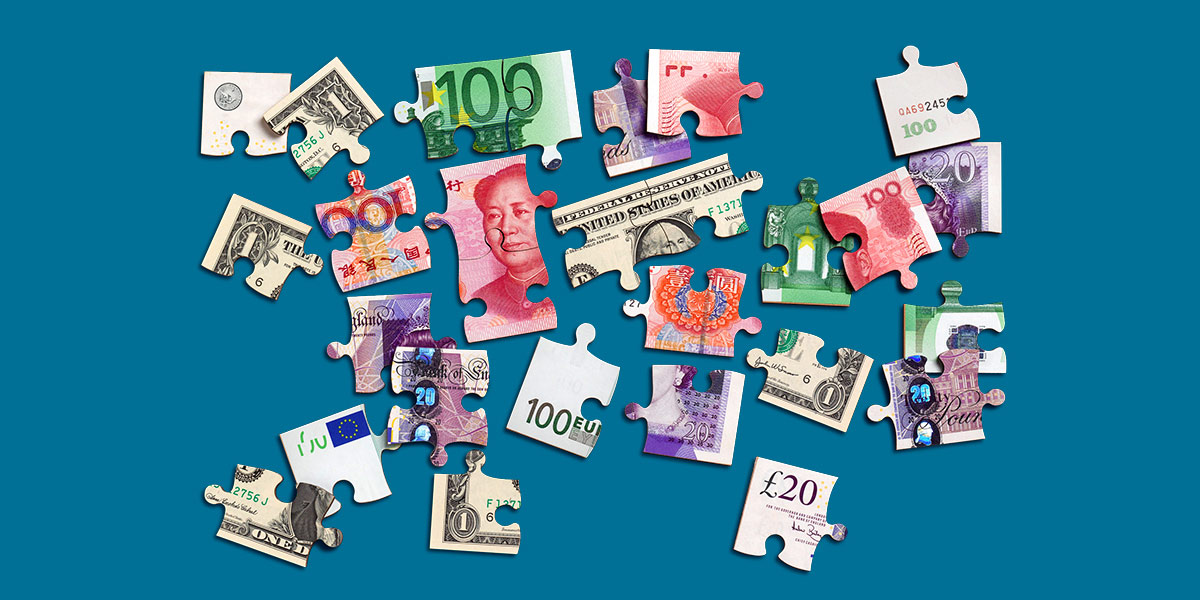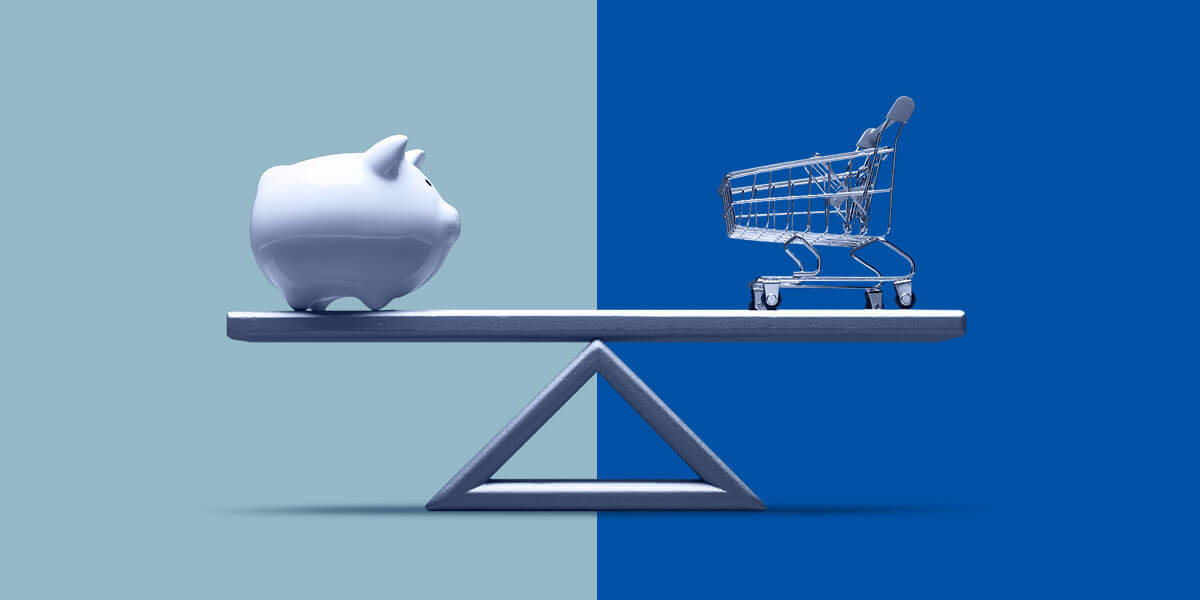-
Personal Banking -
Insights
Tips to Help Improve Your Financial Wellness
Do you stress about finances? You're not alone.
According to a recent study, 70% of Americans report feeling financially stressed. And feeling financially stressed can have a negative effect on your sleep, energy level, overall happiness and even your heart health.
But you don't have to let money stress impact your health. Instead, you can take steps to alleviate your money anxieties and work towards financial wellness.
Feeling healthy financially can help you maintain control over your finances, respond effectively to financial unpredictability and unexpected expenses, and help you meet your financial goals and make choices that allow you to enjoy life.
Start With Financial Wellness Goals
The first step to achieving financial wellness is to set those goals. The financial achievements that matter to one person may not matter to another, so you have to determine what matters to you.
Take time to figure out the specific goals that would make you feel financially secure. For instance, do you want to save 15% of your salary every year? Do you want to save up enough to buy your first home or buy a new car? Do you want to build an emergency fund equal to six months' worth of expenses?
Strategies to Improve Financial Wellness
Whatever your financial wellness goals, there are a number of best practices that can help you gain better control of your money and move closer to meeting those goals.
Consider starting with these nine tips to help improve your financial health.
1. Budgeting
Creating a basic budget is the first step to taking control of your finances. In the simplest terms, a budget is a plan for how to spend your money. If you don't have a budget, you likely aren't keeping track of where your money goes each month.
Basic budgeting methods:
- The cash envelope system, also known as “cash stuffing," is a method of portioning your income in cash among various envelopes. You might have one envelope for dining out, another for groceries, and another for clothing. Aside from paying your fixed monthly bills, you always pay in cash and spend only the cash that you have portioned for the appropriate category for the month.
- The 50/30/20 budget is a system that has users allocate 50% of their money to necessities, 30% to wants and 20% to savings and debt repayment.
- The zero-based budget closely monitors your spending by tracking every dollar you spend until there are zero dollars left in your budget. This method requires you to be meticulous but it can be easier to follow because there are budgeting apps designed for it.
- The pay-yourself-first budget focuses on savings before spending. Users of this method determine how much they want to save each month, set that aside, and then allocate the rest of their funds to pay bills, expenses and other costs of living.
Budgeting is different for everyone, so the best plan for you is the one that meets your personal needs, goals and spending habits.
2. Save for Your Future
No matter how you budget, be sure to include a savings account and a retirement fund to help you be prepared for whatever comes in the future. Consider setting up automatic withdrawals from your paycheck for savings and retirement. Keep these accounts separate to ensure there is no confusion on what money goes where.
3. Save for Emergencies
Everybody occasionally has unexpected expenses, such as a major car or home repair. But when you have savings set aside in an emergency fund, those unexpected expenses don't require you to take on new debt or stress about how you'll cover them.
Work to create an emergency fund of three to six months' worth of expenses to help avoid going further into debt when an emergency arises. Consider setting aside $25 per week (or more if you can afford it) in a separate emergency fund—and only tap into it when you have a true emergency.
4. Stay Involved with Your Finances
Don't leave your finances alone. It's important to keep an eye on your checking account and budget on a daily basis, and your other accounts on a monthly basis. Be sure to keep a record of where your money is and your plans for using it. Also, keep track of the next steps in your financial plan.
You don't have to tackle your finances alone! Consider working with a wealth planner to gain the confidence that having a professional in your corner can provide.
5. Pay Down Debt
Unsustainable levels of debt can cause significant financial stress. If you're spending a large chunk of your income to make debt payments and interest payments, you may not be able to save money, become financially independent, or meet your other financial goals. Create a plan for paying off debt such as student loans, car loans and credit cards.
6. Avoid Building More Debt
As you work to pay off loans, don't go open unnecessary lines of credit or run up credit card balances. Once you've paid off one loan or card, keep paying off the others.
If your debt is substantial, avoid buying more things with credit until it is paid off. This can help you improve your credit score, avoid paying unnecessary interest and increase your financial wellness.
The Debt Avalanche Method
Debt can be one of the most crippling aspects of personal finances for many people. Whether you have debt from past hardships or from poor spending habits, paying it off can significantly improve your financial wellness.
One method of paying down debt is known as the debt avalanche method. This process involves focusing on paying off debts with the highest interest rates first. This way, the debts that are growing at the fastest rates are paid off first.
7. Refinance Loans as Your Credit Score Improves
If your credit score is not where you would like it to be, it will gradually improve as you pay down debt. When it does, consider consolidating your debt and refinancing high-interest loans to lower rates. But be cautious — fraudsters sometimes mask their schemes as "debt-consolidation" services and market them to unsophisticated individuals and those in desperate financial trouble.
If you can successfully consolidate your debt into lower-interest loans, it can save you money over time and make it easier to continue moving your finances in the right direction.
8. Review Tax Saving Options
Take a close look at tax-advantaged plans that are open to you, such as 401(k) plans, IRAs, health savings accounts (HSA), or 529 college savings accounts. While they are not for every individual or circumstance, these accounts can reduce your tax liability while also allowing you to meet your goals and build the future you want.
9. Find Opportunities to Cut Back
Now that you have set up a strong foundation for paying off debt and building your savings, review your monthly expenses to look for areas where you may be able to cut back. Maybe you could cancel unused streaming subscriptions, get a cheaper mobile phone plan, or start using coupons to lower your grocery bill. By finding ways to cut your budget, you can save more money and boost your financial wellbeing.
The views expressed represent the opinions of City National Bank (CNB) which are subject to change and are not intended as a forecast or guarantee of future results. Stated information is provided for informational purposes only, and should not be perceived as personalized investment, financial, legal or tax advice or a recommendation for any security. It is derived from proprietary and non-proprietary sources which have not been independently verified for accuracy or completeness. While CNB believes the information to be accurate and reliable, we do not claim or have responsibility for its completeness, accuracy, or reliability. Statements of future expectations, estimates, projection, and other forward-looking statements are based on available information and management's view as of the time of these statements. Accordingly, such statements are inherently speculative as they are based on assumptions which may involve known and unknown risks and uncertainties. Actual results, performance or events may differ materially from those expressed or implied in such statements.
City National, its managed affiliates and subsidiaries, as a matter of policy, do not give tax, accounting, regulatory or legal advice, and any information provided should not be construed as such. Rules in the areas of law, tax, and accounting are subject to change and open to varying interpretations. You should consult with your other advisors on the tax, accounting and legal implications of actions you may take based on any strategies presented, taking into account your own particular circumstances.





